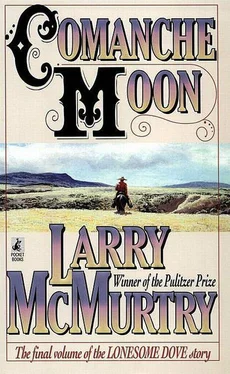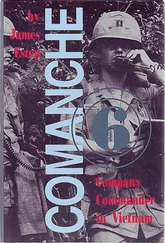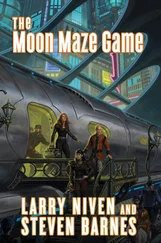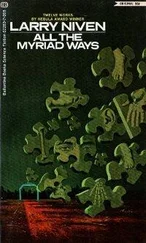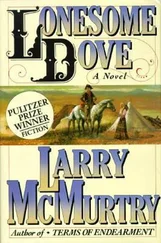The streets of Austin were empty: Jake was gone. Maggie sat by the window a long time, thinking, hoping, looking down at the silent street.
Then, just as she was about to go to bed, she saw Pea Eye roll out of the wagon where he had been napping. Maggie watched, expecting him to walk off--she had never known Pea Eye to be drunk, but then old friends such as Jake Spoon didn't leave the troop every day. It was late in the night and chilly; it had begun to drizzle. Maggie waited, thinking Pea Eye would wake up, stand up, and make his way to the shelter of the bunkhouse.
But he didn't wake up. He lay as he had fallen, flat on his face in the street.
Maggie went to bed, telling herself that Pea Eye was, after all, a grown man--z a roving ranger he had no doubt slept out of doors in far worse weather, and in more dangerous places than the streets of Austin.
Maggie's reasoning failed to convince her--the thought of Pea Eye kept sleep from coming. No doubt he had slept out of doors in worse weather, but, on those occasions, she hadn't been in sight of him. Finally she got up, took a heavy quilt out of her cedar chest, went down the stairs, walked the few steps, covered Pea with the quilt, and pulled him around so that his legs were no longer sticking into the street where a wagon could run over them, as in the case of the senator who lost his hand.
The next morning, when Maggie went down to recover her quilt, Pea Eye was seated with his back to the wagon wheel, looking like a man in shaky health and spirits.
"I wish I could take my head off," he said, to Maggie. "If I could take it off I'd chuck it far enough away that I couldn't feel it throb." "Many a man has ruined his health for good, drinking whiskey with Gus McCrae," Maggie informed him sternly.
Pea Eye didn't dispute the opinion.
"Gus? He can hold more liquor than a tub," he said. "Is this your quilt?" "Yes, I thought I better cover you," Maggie said.
"I had an awful dream," Pea Eye said.
"I dreamed a big Comanche held me up by my legs and scalped me." "That wasn't a Comanche, that was me," Maggie said. "Your legs were sticking into the street--I was afraid a wagon would run over you, so I pulled you around." "Jake's gone off to Colorado to find a silver mine," Pea Eye said.
Maggie didn't answer. Instead, to Pea Eye's consternation, she began to cry. She didn't say anything; she just took her quilt and walked home with it, crying.
Pea Eye, never certain about what women might do, got up at once and walked back to the bunkhouse. He resolved in future never to get drunk and fall asleep where a woman might spot him. That way there would be no tears.
"Maybe I shouldn't have talked about my dream," he said, a little later, discussing the incident with Deets.
"Do you think it would upset a woman to hear about my dream?" Pea asked.
"Don't know. I ain't a woman and I ain't had no dream," Deets said.
Inish Scull--General Scull now, thanks to a brilliant, some would say brutal, series of victories in the long conflict with the South--had just settled into his study, with the morning papers and a cup of Turkish coffee, when his nephew Augereau, a wispy youth with French leanings, wandered in with an annoyed look on his face.
"It's a damn nuisance, not having a butler," Augereau said. "Why would Entwistle enlist?" "I suppose he didn't want to miss the great fight," General Scull replied. "I didn't so much mind his enlisting--the real nuisance is that the man got himself killed, and within two weeks of the armistice too. If the fool had only kept his head down for another two weeks you wouldn't be having to answer the door, would you, Augereau?" "It is rather annoying--I ain't a butler," Augereau said. "I was reading Vauvenargues." "Well, Vauvenargues will keep, but what about the fellow at the door? I suppose it was a fellow," Scull said.
"Yes, I believe he's a colonel," Augereau said.
"There's no reason to expect. Either he is or he isn't," Scull said. "Would it discommode you too much to show him in?" "I suppose I could show him in, since he's here," Augereau said. "I say, will Auntie Inez be back soon? It's a good deal more jolly when Auntie Inez is here." "Your aunt just inherited a great deal of money," Scull informed him. "She's run off to Cuba, to buy another plantation. I don't know when she'll be returning. Her tropical habits ain't exactly suited to Boston." "Oh what, the masturbation?" young Augereau said. "But there was a lap robe and they were in a carriage. What's the bother?" "Augereau, would you mind going and getting that colonel?" Scull said. "We can discuss your dear Auntie's behaviour some other time." Augereau went to the door, but he didn't quite exit the study. He stood for almost a minute right in the doorway, as if undecided whether to go out or stay in.
"The fact is, I don't much care for Vauvenargues," he said. "I do care for Auntie--hang the bloody masturbation!" Then, before Scull could speak to him again about the colonel he had misplaced somewhere in the house, Augereau turned and drifted off, leaving the door to the study ajar, a lapse that irritated Scull intensely. He liked doors, drawers, shutters, windows, and cabinets to be closed properly, and, on balance, was more annoyed with his impeccably trained butler, Entwistle, for getting himself shot at an obscure depot in Pennsylyania than he was at Inez for masturbating old Jervis Dalrymple in an open carriage injudiciously parked near Boston Common. Somehow the lap robe had slipped during the operation; to Inez's annoyance the policeman who happened to be passing was a tall Vermonter, well able to look into the carriage and witness the act, which resulted in a charge of public fornication, not to mention much fuss and bother.
"Really, you Yankeesffwas Inez remarked in annoyance. "I was only doing off his pizzle in order to calm him down. I couldn't take him into Mr. Cabot's tea party in that state, now could I? He might have thrust himself on some innocent young miss." "I have no doubt your action was well intended," Scull told his wife, "but you might have been more careful about where you parked." "I'll park where I please--th is a free country, or at least it was until you filthy Yankees won the war," Inez told him, her fury rising. "It was no worse than milking a cow. I suppose next I'll be arrested if I decide to milk my Jersey in public." "Your Jersey and a Dalrymple pizzle are not quite the same thing, not in the eyes of Boston," Scull informed her. He had recently been forced to turn all the Scull portraits face to the wall, to prevent Inez from ruining them with her wild quirtings.
Young Augereau never reappeared, but, after a bit, Scull heard a tread in the hallway, a hesitant and rather unmilitary tread. He put down his Turkish coffee and stepped out of the study just in time to stop a thin, stooped colonel in the United States Army from proceeding along the almost endless hallway.
"I'm here, Colonel--we lost our butler, you know," Scull said.
"I'm Colonel Soult," the man said. "We met not long after Vicksburg, but I don't suppose you remember. That's S-o-u-l-t--x's often confused with "salt."' In my youth I was called "Salty"' because of the confusion." Scull had no memory of the man, but he did recall seeing the name "Soult"' on a muster roll or document of some sort.
"Samuel Soult, is it?" he inquired, only to see a flush of delight come to the man's sallow features.
"Why, yes, that's me, Sam Soult," he said, shaking Scull's hand.
"What brings you to our old Boston, Colonel Soult?" Scull asked, once the two of them were settled in his study. A sulky cook had even been persuaded to bring Colonel Soult a cup of the strong Turkish coffee General Scull now favored.
Scull wore the multilensed dark glasses he had worn throughout the war--glasses which got him the nickname "Blinders" Scull. With a touch of his finger he could regulate the tint and thickness of the lenses to compensate for whatever intensity of light prevailed. The study, at the time, was rather a litter. Scull could see that the disorder offended the neat colonel a little; but, by the end of the war, he was in a fever of impatience to get back to the book he had just started writing when the conflict broke out: The Anatomy and Function of the Eyelid in Mammals, Reptiles, Fish, and Birds. At the moment he was plowing through the classical authors, noting every reference to the eyelids, however slight. A towering pile of papers, journals, books, letters, photographs, and drawings had had to be dumped out of the chair where Colonel Soult was by now rather cautiously sitting.
Читать дальше
